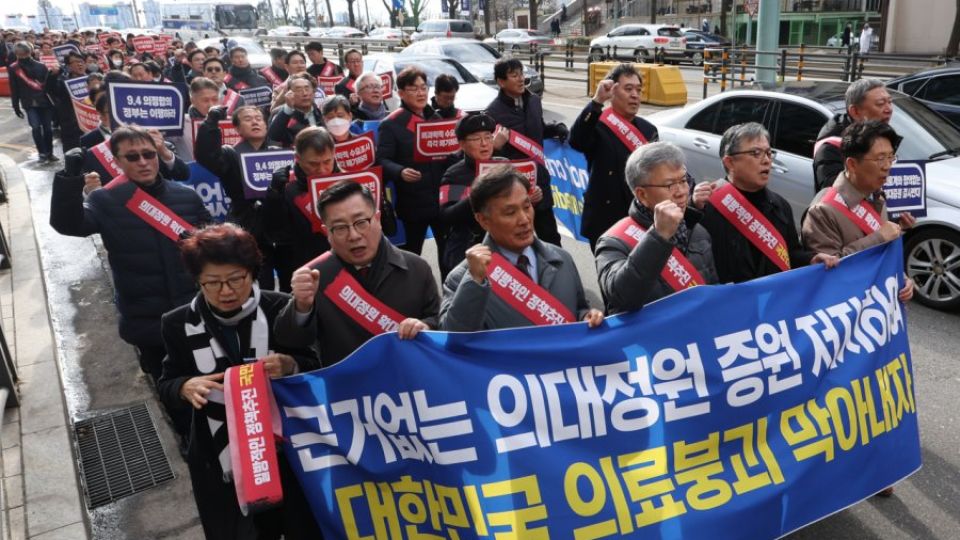February 26, 2024
SEOUL – South Korea’s health crisis deepened Sunday as recent medical graduates began to join doctors’ collective action against medical school expansion by refusing to take up internships, dashing what hopes there were that they might fill the health care vacuum left by striking trainee doctors.
Doctors took to the streets in the afternoon. They claimed the government plan was “unscientific” and asserted that they are “not criminals,” in response to threats of legal action against those refusing to return to work.
Asked whether the government was considering renegotiating with doctors on the size of the increase in medical school places, President Yoon Suk Yeol’s office said it saw the extra 2,000 seats as necessary, and that the initial number the government had pushed for was 3,000.
The office also blasted doctors’ collective action, claiming that “in no other country in the world have doctors taken such extreme actions holding patients’ lives as hostages.”
According to medical communities, medical school graduates across the nation are considering taking action by giving up on their internships at teaching hospitals which they were to start at the beginning of March.
All 32 soon-to-be interns have given up employment in Chosun University Hospital and Soonchunhyang University Hospital respectively, and 60 at Chungnam National University Hospital.
At Chonnam National University Hospital in Gwangju, 86 out of 101 interns submitted a waiver of internships. More than 400 graduates at some 10 hospitals in non-Seoul regions reported to have given up on their internship as of Sunday. Big hospitals in Seoul refused to give the number of graduates refusing to apply.
Medical graduates usually start by working at teaching hospitals as interns. South Korea has around 3,000 medical graduates a year.
“If pre-interns give up their appointments en masse and the hospital situations without them are prolonged, the workload of those who remain in hospitals will only increase,” said an official at a training hospital in Seoul.
Such walkouts are expected to pose a heavy burden on fellow doctors who have been filling the gap, igniting another possibility that fellows could also leave hospitals.
Fellows are doctors who have finished medical school and their residency and have chosen to further study a subspecialty in medicine, staying in the hospital on a contractual basis before being appointed as professors.
Fellows and professors said they had been filling the gap left by junior doctors by treating outpatients, managing and taking care of inpatients, performing surgeries, and covering the night shifts.
Some hospitals are reported to have switched from the usual three-shift to two-shift system due to a lack of resources to keep the emergency room open around the clock.
Fellow doctors, who often renew their contracts yearly at the end of February, are seriously considering if they should extend their contracts, swayed by the heavy workload in a situation where the return of trainee doctors is unlikely, medical resources said.
“Originally, fellows have one-year contracts, so not resuming the contract doesn’t mean that they resign, it just means that they don’t want to stay at the hospital anymore,” one fellow at a major hospital in Seoul said. “I think they’re tired and can’t do it anymore because they have to take on all the work that trainee doctors used to do.”
He also expressed skepticism, saying, “There is an atmosphere that if you work hard and stay at the university hospital, you will only be criticized.”
With the burden of over work, there is an atmosphere among fellows that they could also be criticized despite their hard work by staying at the hospital, the source added.
“The reason hospitals are still open and running is because one fellow is doing the work of three trainee doctors,” said another fellow doctor at a hospital in Seoul, warning that “a real health crisis would come after Feb. 29.”
With the current situation, 30 percent of university hospital doctors will leave by March, warned Kim Sung-geun, Vice Chairman of the emergency committee at the Korean Medical Association, saying that “the devastating situation has yet to start.”
Groups of professors who had been encouraging trainee doctors and medical students to return to their positions have also shown a strong drive to join the collective actions, once the doctors are punished.
The Medical Professors Association of Korea released a statement Saturday that read, “As teachers, we will not just sit and watch unfair punishments imposed on our students.”
The association also signaled the possibility they could join the action unless there are reasonable measures taken.
The government decided to dispatch prosecutors to the Health Ministry to advise on legal grounds over the collective actions of doctors on strike.
Front-line prosecutors’ offices across the country are also holding prosecutor-police meetings to establish a cooperative system for swift judicial proceedings.
Regarding the mass resignation of doctors and suspension of medical treatment, the Health Ministry has issued orders to the medical institutes to prohibit what they see as collective resignation letters and maintain essential medical treatment.
For doctors who have been confirmed to have suspended treatment, administrative measures such as suspension or revocation of their medical licenses and prosecution will be taken if they do not comply with the order to resume work.


